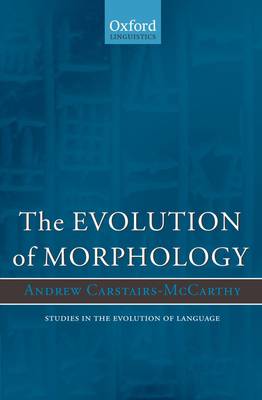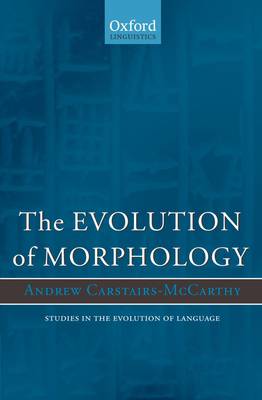
- Retrait gratuit dans votre magasin Club
- 7.000.000 titres dans notre catalogue
- Payer en toute sécurité
- Toujours un magasin près de chez vous
- Retrait gratuit dans votre magasin Club
- 7.000.0000 titres dans notre catalogue
- Payer en toute sécurité
- Toujours un magasin près de chez vous
Description
This book considers the evolution of the grammatical structure of words in the more general contexts of human evolution and the origins of language. The consensus in many fields is that language is well designed for its purpose, and became so either through natural selection or by virtue of non-biological constraints on how language must be structured. Andrew Carstairs-McCarthy argues that in certain crucial respects language is not optimally designed. This can be seen, he suggests, in the existence of not one but two kinds of grammatical organization - syntax and morphology - and in the morphological and morpho-phonological complexity which leads to numerous departures from the one-form-one-meaning principle.
Having discussed the issue of good and bad design in a wider biological context, the author shows that conventional explanations for the nature of morphology do not work. Its poor design features arose, he argues, from two characteristics present when the ancestors of modern humans had a vocabulary but no grammar. One of these was a synonymy-avoidance expectation, while the other was an articulatory and phonological apparatus that encouraged the development of new synonyms. Morphology developed in response to these conflicting pressures.
In this stimulating and carefully argued account Professor McCarthy offers a powerful challenge to conventional views of the relationship between syntax and morphology, to the adaptationist view of language evolution, and to the notion that language in some way reflects 'laws of form'. This fundamental contribution to understanding the nature and evolution of language will be of wide interest to linguists of all theoretical persuasions as well as to scholars in cognitive science and anthropology.
Having discussed the issue of good and bad design in a wider biological context, the author shows that conventional explanations for the nature of morphology do not work. Its poor design features arose, he argues, from two characteristics present when the ancestors of modern humans had a vocabulary but no grammar. One of these was a synonymy-avoidance expectation, while the other was an articulatory and phonological apparatus that encouraged the development of new synonyms. Morphology developed in response to these conflicting pressures.
In this stimulating and carefully argued account Professor McCarthy offers a powerful challenge to conventional views of the relationship between syntax and morphology, to the adaptationist view of language evolution, and to the notion that language in some way reflects 'laws of form'. This fundamental contribution to understanding the nature and evolution of language will be of wide interest to linguists of all theoretical persuasions as well as to scholars in cognitive science and anthropology.
Spécifications
Parties prenantes
- Auteur(s) :
- Editeur:
Contenu
- Nombre de pages :
- 268
- Langue:
- Anglais
- Collection :
- Tome:
- n° 14
Caractéristiques
- EAN:
- 9780199299782
- Date de parution :
- 22-02-10
- Format:
- Livre relié
- Format numérique:
- Genaaid
- Dimensions :
- 236 mm x 160 mm
- Poids :
- 557 g

Les avis
Nous publions uniquement les avis qui respectent les conditions requises. Consultez nos conditions pour les avis.






